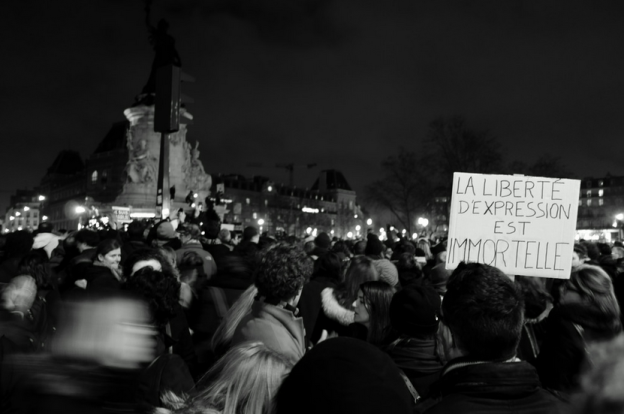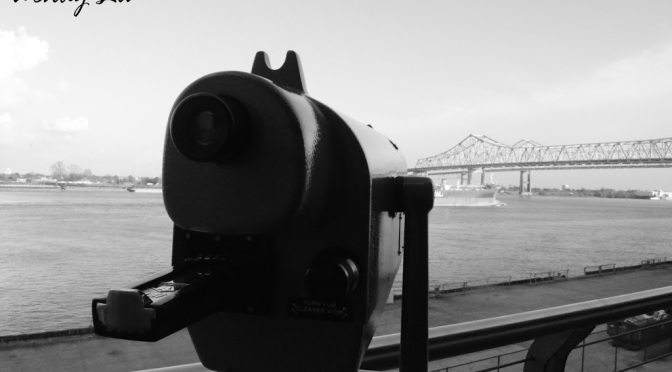#DailyWings: “I do not agree with what you have to say, but I’ll defend to the death your right to say it.” –Eduardo Galeano
I was at work when I learned about what had happened in Paris on January 7. At the office, we have about seven or eight television screens, all of which display breaking news from CNN or sports on a daily basis. I walked past the largest TV during lunch, a napkin and utensils in my hand, when I saw the headline about terrorists on the loose in Paris. People were wounded, even dead.
“Why would anyone want to attack the French?” was my initial reaction. Admittedly, I don’t know much about France outside of the stereotypes revealed to me through movies and other media growing up, and unfortunately I don’t follow French news the way I follow Chinese, American and UK news. Even with the underlying knowledge that French people aren’t all alike, I’d always viewed them as being romantic, chic and peaceful foodies.
It wasn’t until later that I learned three masked individuals — later discovered to be Islamists — had attacked the headquarters of Charlie Hebdo, a satirical Parisian weekly newspaper known for publishing crude, controversial material (mainly about religion and politics). The attacks didn’t stop there. Two days later, terrorists related to the first incident attacked people in a supermarket where many Jewish Parisians live and congregate.
This isn’t the first time Charlie Hebdo has been the target of an attack. In 2011, their website was hacked and the newspaper office was firebombed after Charlie Hebdo declared the Prophet Muhammad as the next editor-in-chief (thankfully, no one got hurt). The publication has also previously been sued by French Muslim organizations and caused French embassies and other institutions to temporarily close after the newspaper released caricatures of Prophet Muhammad.
Since the Charlie Hebdo massacre, people around the world have joined one another in solidarity to mourn those who have been lost. More than 1.6 million people participated in a unity march in Paris, and more rallies have taken place around the country as well as in other nations, according to BBC. On social media, people have taken to using the hashtag #JeSuisCharlie (“I am Charlie” in French) to show support for victims and their families, and to send the message that free speech shall prevail.
#JeSuisCharlie Powerful Photos of Solidarity Pour in from Around the Globe https://t.co/2GDhYZcbBn @500px pic.twitter.com/mc1wfDlQTh
— kuchiFm Fotos (@hacerfotos) January 12, 2015
Countless articles have already addressed the role of #JeSuisCharlie in freedom of the press issues, and media channels like CNN are scrambling to provide hour-by-hour coverage and shoot stories from every angle of the tragedy. However, I haven’t seen many blogs try to answer this question: Why, exactly, should we defend our freedom of expression?
Out of all the classes in college that I thought were going to be useless, Political Science 100 was at the top of the list. But here’s a concept I was introduced to in that class that has stuck with me for years, and provides a pretty compelling argument for why society needs to freely express themselves: the marketplace of ideas.
I’m going to try to not get all philosophical and boil it down to colloquial terms: the marketplace of ideas is a metaphor developed by John Stuart Mill that basically states we should mix all of our ideas and thoughts and opinions together so that the truths can “out-compete” all the bullshit. Of course, there are a few issues with this metaphor, such as how do we really know if something is the truth? What if, hypothetically, there are too many extremists that convince everyone that their ideas are correct, and there aren’t enough moderates? Even though the marketplace of ideas makes some lofty assumptions, I think the general idea is on point.
Every once in a while, it’s important for us to take a mental step back and think about why we hold onto our personal values and beliefs. Did we grow up with them? Did the media teach them to us? Did our friends? Think about the company you keep. The more we interact with people who have the same ideas about the world, the more our beliefs are reinforced and strengthened over time, and the more reluctant we are to budge – even if a perfectly reasonable counter-argument is presented (another concept I learned in Poli 101).
This is very close to Robert Pirsig’s idea of value rigidity, which he discusses in Zen and the Art of Motorcycle Maintenance. When there’s value rigidity, you stubbornly cling onto your values without ever mentally challenging yourself against those values in search for a better answer. Exposure to people or thoughts that are different from ourselves teaches us what else is out there, and keeps us in check. We make sure our value rigidity hasn’t led us astray, or worse, kept us in a cage. At the same time, we’re also able to justify that we still believe in something for the right reasons, whatever they may be.
For instance, I strongly dislike the online blog Elite Daily. That website is like the love child of Thought Catalog and The Daily Dot, except it perpetuates gender stereotypes and uncomfortable social norms by churning out headlines such as “9 Chivalrous Habits Of A True Gentleman That Makes Women Melt” and “Make Him Miss You: Why You Have to Leave To Get Him To Stay.” Even though the stories make my eyes roll and sometimes even anger me, I have yet to “Unlike” Elite Daily on Facebook because occasionally reading these stories reminds me why I am a feminist or what’s wrong with putting all relationships into one category.
Back to Charlie Hebdo. There are always some exceptions to the rights to freedom of expression, such as speech that is meant to promote violence or exploit children. Some censorship is necessary to protect people’s safety. But there will never, ever be a justifiable reason for physically hurting people for what they said, wrote or drew. No matter how offended we may get by a message or how rigid our values are, it is not worth taking a life.
“Thanks to the Internet…more people than ever are committing acts of journalism.” http://t.co/5NVPy4XFfP #JeSuisCharlie #PressFreedom
— PBS MediaShift (@PBSMediaShift) January 13, 2015









